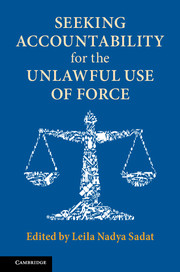Book contents
- Frontmatter
- Dedication
- Contents
- Notes on Contributors
- Foreword
- Preface
- Table of Cases
- Introduction
- PART I HISTORIC AND CONTEMPORARY PERSPECTIVES ON THE UNLAWFUL USE OF FORCE
- PART II MECHANISMS FOR RESTRAINING THE UNLAWFUL USE OF FORCE AND ENHANCING ACCOUNTABILITY
- 7 Commissions of Inquiry and the Jus ad Bellum
- 8 The International Court of Justice and the Use of Force
- 9 The Other Enemy: Transnational Terrorists, Armed Attacks, and Armed Conflicts
- 10 Toward the Substantive Convergence of International Human Rights Law and the Laws of Armed Conflict: The Case of Hassan v. the United Kingdom
- 11 International Law on the Use of Force: Current Challenges
- PART III THE ILLEGAL USE OF FORCE AND THE PROSECUTION OF INTERNATIONAL CRIMES
- PART IV IMAGINING A BETTER WORLD
- Epilogue
- Index
11 - International Law on the Use of Force: Current Challenges
from PART II - MECHANISMS FOR RESTRAINING THE UNLAWFUL USE OF FORCE AND ENHANCING ACCOUNTABILITY
Published online by Cambridge University Press: 21 May 2018
- Frontmatter
- Dedication
- Contents
- Notes on Contributors
- Foreword
- Preface
- Table of Cases
- Introduction
- PART I HISTORIC AND CONTEMPORARY PERSPECTIVES ON THE UNLAWFUL USE OF FORCE
- PART II MECHANISMS FOR RESTRAINING THE UNLAWFUL USE OF FORCE AND ENHANCING ACCOUNTABILITY
- 7 Commissions of Inquiry and the Jus ad Bellum
- 8 The International Court of Justice and the Use of Force
- 9 The Other Enemy: Transnational Terrorists, Armed Attacks, and Armed Conflicts
- 10 Toward the Substantive Convergence of International Human Rights Law and the Laws of Armed Conflict: The Case of Hassan v. the United Kingdom
- 11 International Law on the Use of Force: Current Challenges
- PART III THE ILLEGAL USE OF FORCE AND THE PROSECUTION OF INTERNATIONAL CRIMES
- PART IV IMAGINING A BETTER WORLD
- Epilogue
- Index
Summary
INTRODUCTION
According to St. Malachy's Prophecy of the Popes, Pope Francis's reign (from 2013 onward) should be the time of “many tribulations.” It appears that some key events of the period in question do match the prophecy indeed: the rise of the Islamic State and the ongoing armed conflict in Syria, the annexation of Crimea by the Russian Federation in March 2014, its subsequent provision of support to separatists in Eastern Ukraine, and the downing of the MH17 plane in July 2014 are just a few tragic events currently filling the international agenda. The military, political, and humanitarian implications of these developments are immense. They also challenge international law in a number of ways, and this law has to evolve in order to withstand these challenges of indeed universal gravity and scale. Important figures in international politics time and again refer to these events (many of which are interconnected) as the Third World War – and if it is one, international law seems to be quite unprepared for it. Some important deficiencies in the applicable law were revealed already after September 11, 2001, as the “war against terrorism” started unfolding, but these deficiencies turned out to be more numerous and farreaching in the years to come. Whereas the “war against terrorism” – itself a doubly untimely term – affected, above all, the law of armed conflict and international human rights law, subsequent challenges reached to the very core of modern international law: the law of international security. This Chapter examines some of these challenges – especially as far as the international legal regulation of the use of force is concerned – and makes proposals for the progressive development of international law.
THE THREAT OF THE ISLAMIC STATE
The Islamic State of Iraq and Syria (ISIS, also known as Daesh) is among the most important threats to international peace and security – not only in terms of the actual dangers it poses to international peace and security and the well-being of identifiable (ethnic or religious) groups of individuals, but also due to the fact that existing international law is somewhat helpless against it because it does not fit within the Islamic State's quasi-religious ideology. Historically, international law was a product of European civilization, which fact, by definition, makes “Christian” international law a phenomenon “alien” and a priori unacceptable to the Islamic State.
- Type
- Chapter
- Information
- Seeking Accountability for the Unlawful Use of Force , pp. 273 - 282Publisher: Cambridge University PressPrint publication year: 2018
- 4
- Cited by

